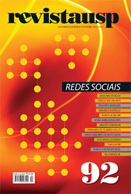Digital Networks, epistemologies reticular ad the crisis of social Anthropomorphism
DOI:
https://doi.org/10.11606/issn.2316-9036.v0i92p6-19Keywords:
digital social networks, post-humanism, theory of complexity, ecosystems.Abstract
The onset of digital networks has set itself – theoretically speaking – as an opportunity for an analysis not only on the role communication plays in our society, but also on the transformation knowledge has gone through, and on the innovation dynamics of our contemporary world. From that viewpoint, this article puts forward a conceptual reflection as it advances an intricate perspective as an epistemological rupture. The origins of such rupture are rooted in a variety of fields of knowledge from the first half of the 20th century; and it has little by little set itself as a new way to explain the complexity whose concrete expression lies in the technological and communicative form. The spread of the intricate information architecture of a global intelligence shows the need for rethinking social anthropomorphism, and has become one of the hermeneutical challenges of our times.
Downloads
References
BARAN, P. On Distributed Communications: I. Introduction to Distributed Communications Network. California, The Rand Corporation, 1964.
CAPRA, F. A Teia da Vida. São Paulo, Cultrix, 1997.
. O Ponto de Mutação. A Ciência, a Sociedade e a Cultura Emergente. Tradução de Álvaro Cabral. São Paulo, Cultrix, 2006.
CASTELLS, M. A Galáxia da Internet: Reflexões sobre a Internet, os Negócios e a Sociedade. Rio de Janeiro, Jorge Zahar, 2003.
DEKERCKHOVE, D. A Pele da Cultura. São Paulo, Annablume, 2010.
DIFELICE, M. (org.). Do Público para as Redes. A Comunicação Digital e as Novas Formas de Participação Social. São Paulo, Difusão, 2008; Paisagens Pós-urbanas: o Fim da Experiência Urbana e as Formas Comunicativas do Habitar. São Paulo, Annablume, 2009.
PIREDDU, M. Pós-humanismo. São Paulo, Difusão, 2010.
. TORRES, J. C.; YANAZE, L. K. H. Redes Digitais e Sustentabilidade – as Interações com o Meio Ambiente na Era da Informação. São Paulo, Annablume, 2011.
FORTIN, R. Compreender a Complexidade. Lisboa, Piaget, 2007.
LATOUR, B. Políticas da Natureza. São Paulo, Edusc, 2004.
LÉVÊQUE, C. Ecologia – do Ecossistema à Biosfera. Lisboa, Instituto Piaget, 2001.
LÉVY, P. A Inteligência Coletiva: por uma Antropologia do Ciberespaço. São Paulo, Loyola, 2000.
MATURANA, H.; VARELA, F. A Árvore do Conhecimento – As Bases Biológicas do Conhecimento Humano. Campinas, Ed. Psy, 1995.
McLUHAN, M. Understanding Media – the Extensions of Man. EUA, MIT Press, 1994.
MEYROWITZ, J. No Sense of Place. The Impact of Electronic Media on Social Behaviour. Oxford, Oxford University Press, 1985.
MORIN, E. La Méthode 1. La nature de la Nature. Paris, Editions du Seuil. 1977.
. Introdução ao Pensamento Complexo. Porto Alegre, Sulina, 2011.
Downloads
Published
Issue
Section
License
Copyright (c) 2023 Revista USP

This work is licensed under a Creative Commons Attribution-NonCommercial-ShareAlike 4.0 International License.
|
Pertence à revista. Uma vez publicado o artigo, os direitos passam a ser da revista, sendo proibida a reprodução e a inclusão de trechos sem a permissão do editor. |


